
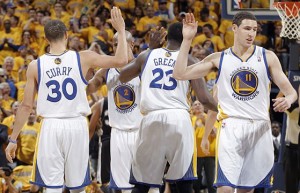 The Golden State Warriors are one of the most intriguing teams to watch in the NBA, thanks in large part to having the most dynamic backcourt simply known as”The Splash Brothers”. Aside from that, the team has also made vast improvements in offensive execution compared to previous years, where the ball no longer sticks too long in one player’s hands. They have the third best offense in the league, which is miles better than where they were last season (12th).
The Golden State Warriors are one of the most intriguing teams to watch in the NBA, thanks in large part to having the most dynamic backcourt simply known as”The Splash Brothers”. Aside from that, the team has also made vast improvements in offensive execution compared to previous years, where the ball no longer sticks too long in one player’s hands. They have the third best offense in the league, which is miles better than where they were last season (12th).
Make no mistake, though: the Warriors are considered true contenders and are taken seriously by just about all anaylsts, players and fans alike due to who they are on the defensive end of the floor.
Yes, they are and have been the best defensive team in the league for much of this season. Andrew Bogut is widely known as one of the best rim protectors in the league, Klay Thompson is now recognized as one of the premier two-way players at the two, defensive assistant Ron Adams hasn’t been able to stop gushing about Stephen Curry’s underrated defense all year long (he leads the league with 2.1 steals), Andre Iguodala’s defense is still indispensable off the bench then there’s the do-it-all Swiss army knife in Draymond Green, who replaced David Lee in the starting lineup and is there to stay for the long haul.
That said, I will let Ethan Sherwood Strauss of ESPN go into great detail about how this incredible defense was built:
“It doesn’t just happen,” assistant GM Travis Schlenk said of Golden State’s defensive success. “When you look at the guys, other than Andre [Iguodala] and Shaun [Livingston], they’re all guys we’ve drafted. We’ve made a focal point from when I came on the front office side. The guys we’ve looked to draft have all been long.”…
For the Warriors, positions mean so little on defense because they’ve built a roster comprised of guys the same size. The players and coaches call it “versatility,” a common set of qualities that allows the team to constantly switch on and off the ball. With Iguodala, Livingston, Klay Thompson, Draymond Green, Harrison Barnes and Justin Holiday, Golden State has a half-dozen long, defensively talented players who stand between 6-foot-6 and 6-foot-8. That height range is perfect for navigating between marking little guys and grappling with big men. For example, Green typically guards power forwards, but he can stop Chris Paul in a pinch.
The interchangeability of the resistance flusters offenses. Screen Iguodala, and here comes Thompson, who happens to be the exact same height. Screen Thompson, and here comes Green, who happens to be the exact same height. Golden State’s defense is like the T-1000 Terminator villain who casually regenerates whatever body parts you blast off his corpus…
Green now epitomizes Golden State’s defense as someone who tenaciously switches onto anybody and challenges jumpers viciously. As of Tuesday, the Warriors led all teams with 17 blocked 3-pointers, of which Green has swatted seven — more than twice the amount of Cleveland’s entire roster (three) and as many as Anthony Davis. At this point, it’s not a stretch to say he’s gone from the second round to Golden State’s best defensive player.
It’s easy to forget Green wasn’t projected as someone who would frustrate guys such as Blake Griffin. Believed to be too small to play power forward, he spent his time almost exclusively as a wing as a rookie. It came as a shock to the coaches when, in a 2012 game against the Timberwolves, Green effectively stoned a Kevin Love post-up in crunch time.
The above is just a small portion of everything that has happened for the Warriors over the past few years, and most of it has been chronicled in the piece. If you want to learn about the ins and outs of what went down from top to bottom, do visit the linked page.
OTHER NEWS AND ITEMS FROM AROUND THE LEAGUE:
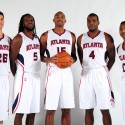 Here’s something I’ve never seen before: the league decided to give five players the “Player of the Month” award for the month of January: “The Atlanta Hawks’ starting five and the Houston Rockets’ James Harden were today named the Kia NBA Eastern and Western Conference Players of the Month, respectively, for games played in January. The Hawks finished the best calendar month in NBA history with a 17-0 record, outscoring opponents by an average of 11.9 points and showing the offensive balance that has defined their surge to the top of the East. All five Atlanta starters averaged double figures in scoring, ranging from 12.3 points to 18.3 points. This marks the first time in league history that a team has gone undefeated in a month with at least 10 victories and had all five starters average double digits but none at 20-plus points. Paul Millsap (18.3 ppg in January), Al Horford (17.1 ppg), Jeff Teague (16.6 ppg) and Kyle Korver (13.4 ppg) all started each of the 16 games they appeared in for the month, and DeMarre Carroll (12.3 ppg) started all 14 of his games. Millsap paced the Hawks in rebounding (8.0 rpg), Teague led them in assists (8.5 apg) and steals (1.81 spg), Horford ranked first in blocks (1.38 bpg) and Korver was the team leader in three-point percentage (56.7).”
Here’s something I’ve never seen before: the league decided to give five players the “Player of the Month” award for the month of January: “The Atlanta Hawks’ starting five and the Houston Rockets’ James Harden were today named the Kia NBA Eastern and Western Conference Players of the Month, respectively, for games played in January. The Hawks finished the best calendar month in NBA history with a 17-0 record, outscoring opponents by an average of 11.9 points and showing the offensive balance that has defined their surge to the top of the East. All five Atlanta starters averaged double figures in scoring, ranging from 12.3 points to 18.3 points. This marks the first time in league history that a team has gone undefeated in a month with at least 10 victories and had all five starters average double digits but none at 20-plus points. Paul Millsap (18.3 ppg in January), Al Horford (17.1 ppg), Jeff Teague (16.6 ppg) and Kyle Korver (13.4 ppg) all started each of the 16 games they appeared in for the month, and DeMarre Carroll (12.3 ppg) started all 14 of his games. Millsap paced the Hawks in rebounding (8.0 rpg), Teague led them in assists (8.5 apg) and steals (1.81 spg), Horford ranked first in blocks (1.38 bpg) and Korver was the team leader in three-point percentage (56.7).”
 With that said, it’s probably a good time to read a little back story on how Mike Budenholzer found his way into the NBA, from Shaun Powell of NBA.com: “He said he didn’t have anything to do and that if I ever wanted help, he’d be available,” said Popovich. “I figured he was someone else I’d have to bring in my office and talk to a bit and then get rid of him. I didn’t have time for this stuff, but he did go to Pomona. So he comes in and I immediately liked him. Engaging young man. I talked to him and then said I had work to do and wished him good luck. Tried to get him out of my office. But he wouldn’t leave. He said he’d do anything.” Popovich took Budenholzer to the Warriors film room and had him break down film and explain what he saw. Budenholzer, leaning on lessons from his father, surprised Popovich with his savvy for players and schemes. So Pop gave instructions: Come here every day, hand me film, don’t say anything to me, don’t ask me for tickets and definitely don’t ask me for money. And Budenholzer did exactly that. “The whole time,” said Popovich, “I don’t think Nellie ever saw him, didn’t know who he was or that he even worked for us.” During the next offseason, back in Arizona, Vince Budenholzer’s phone rang. Popovich on the line. “Where’s Mike?” said Pop. “I think he’s out, but he’ll be back soon.” “Well, if you can get ahold of him, I might just hire his ass.”
With that said, it’s probably a good time to read a little back story on how Mike Budenholzer found his way into the NBA, from Shaun Powell of NBA.com: “He said he didn’t have anything to do and that if I ever wanted help, he’d be available,” said Popovich. “I figured he was someone else I’d have to bring in my office and talk to a bit and then get rid of him. I didn’t have time for this stuff, but he did go to Pomona. So he comes in and I immediately liked him. Engaging young man. I talked to him and then said I had work to do and wished him good luck. Tried to get him out of my office. But he wouldn’t leave. He said he’d do anything.” Popovich took Budenholzer to the Warriors film room and had him break down film and explain what he saw. Budenholzer, leaning on lessons from his father, surprised Popovich with his savvy for players and schemes. So Pop gave instructions: Come here every day, hand me film, don’t say anything to me, don’t ask me for tickets and definitely don’t ask me for money. And Budenholzer did exactly that. “The whole time,” said Popovich, “I don’t think Nellie ever saw him, didn’t know who he was or that he even worked for us.” During the next offseason, back in Arizona, Vince Budenholzer’s phone rang. Popovich on the line. “Where’s Mike?” said Pop. “I think he’s out, but he’ll be back soon.” “Well, if you can get ahold of him, I might just hire his ass.”
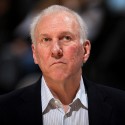 Speaking of Gregg Popovich, he took some time to explain why he dislikes in-between-the-quarters interviews, from Sam Amick of USA Today: “Q: Have you argued to have those after-quarter interviews eliminated? A: Oh, Sure. Hell, I bring it up every year at the head coaches meeting in Chicago, when all the head coaches are there and TNT and ESPN and all the representatives. I raise my hand every year, and I say, “Well guys, you know what I’m going to say. I don’t understand why we have to do this, to subject the coaches and the questioners to this little period of idiocy. They (the TV people) are in our timeouts the entire game. They have cameras in our timeouts. They hear everything we say. They have microphones and they can use anything they want — you know, we trust them. So if they have total access like that, this end of first and third quarter actually takes us away from our job.” And that’s my philosophical difference with them… I said, “I’m supposed to be setting the defense and offense to start the next quarter, and I can’t do my job because I’m doing this inane deal with whoever is asking me a question.” The questions are unanswerable. It’s like, “That quarter, you got killed on the boards. What are you going to do about it?.” “Well, I’m going to conduct a trade during timeouts.” Or, “I’m going to ask them nicely to do a better job on the boards.” The questions just demand a trite quip, or something, so I just say, “You know, it just puts everybody in a stupid position.” And (NBA officials) listen to it, and then they go, “Yeah, well (blabbering).” And then they don’t do anything about it. So I just do what I do.
Speaking of Gregg Popovich, he took some time to explain why he dislikes in-between-the-quarters interviews, from Sam Amick of USA Today: “Q: Have you argued to have those after-quarter interviews eliminated? A: Oh, Sure. Hell, I bring it up every year at the head coaches meeting in Chicago, when all the head coaches are there and TNT and ESPN and all the representatives. I raise my hand every year, and I say, “Well guys, you know what I’m going to say. I don’t understand why we have to do this, to subject the coaches and the questioners to this little period of idiocy. They (the TV people) are in our timeouts the entire game. They have cameras in our timeouts. They hear everything we say. They have microphones and they can use anything they want — you know, we trust them. So if they have total access like that, this end of first and third quarter actually takes us away from our job.” And that’s my philosophical difference with them… I said, “I’m supposed to be setting the defense and offense to start the next quarter, and I can’t do my job because I’m doing this inane deal with whoever is asking me a question.” The questions are unanswerable. It’s like, “That quarter, you got killed on the boards. What are you going to do about it?.” “Well, I’m going to conduct a trade during timeouts.” Or, “I’m going to ask them nicely to do a better job on the boards.” The questions just demand a trite quip, or something, so I just say, “You know, it just puts everybody in a stupid position.” And (NBA officials) listen to it, and then they go, “Yeah, well (blabbering).” And then they don’t do anything about it. So I just do what I do.
- The league also announced that Elfrid Payton and Andrew Wiggins won the honors for Rookie of the Month for January.
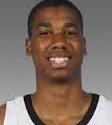 Flip Saunders explained why he believes Hassan Whiteside couldn’t find himself on an NBA team for so long, from Joseph Goodman of Miami Herald: “He fell through the cracks as much as anything because of whether it was people questioned his work ethic, they questioned him off the court in some situations and they questioned his discipline,” Saunders said. “Sometimes what happens is that he’s 25, 26 now. He has matured. Sometimes young players … when he came out he rose so fast at Marshall, sometimes what happens is they’re not ready for that, they’re not ready for the NBA and everything that comes with it, and they think once they’re there everything is going to fall into place. So, I think more than anything he has matured and he has paid dues.”…”I’ve always been a guy that when you go through whether it’s Europe or the minor leagues, you pay those dues and you have a better respect for the game when you get another opportunity,” Saunders said. “And, like I said, going to Miami and Pat [Riley] and [Erik Spoelstra] and those guys, that’s a perfect situation for him because they have had success there, they know what it is, they know what it takes for somebody to be successful, and they’re not going to bend at all.”
Flip Saunders explained why he believes Hassan Whiteside couldn’t find himself on an NBA team for so long, from Joseph Goodman of Miami Herald: “He fell through the cracks as much as anything because of whether it was people questioned his work ethic, they questioned him off the court in some situations and they questioned his discipline,” Saunders said. “Sometimes what happens is that he’s 25, 26 now. He has matured. Sometimes young players … when he came out he rose so fast at Marshall, sometimes what happens is they’re not ready for that, they’re not ready for the NBA and everything that comes with it, and they think once they’re there everything is going to fall into place. So, I think more than anything he has matured and he has paid dues.”…”I’ve always been a guy that when you go through whether it’s Europe or the minor leagues, you pay those dues and you have a better respect for the game when you get another opportunity,” Saunders said. “And, like I said, going to Miami and Pat [Riley] and [Erik Spoelstra] and those guys, that’s a perfect situation for him because they have had success there, they know what it is, they know what it takes for somebody to be successful, and they’re not going to bend at all.”
- Whiteside went on to have a ridiculous night against the Minnesota Timberwolves on Wednesday with 24 points on 12-of-13 shooting from the field (!), 20 rebounds (!), three steals and two blocks in the 102-101 loss.
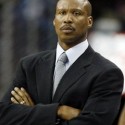 Byron Scott had some interesting things to say about Jason Kidd, the man he once coached back in New Jersey, from Bill Oram of OC Register: “As a first-time head coach with the New Jersey Nets, Byron Scott guided the New Jersey Nets to the NBA Finals. And the anchor of his roster was All-Star point guard Jason Kidd, who carried a bit of a reputation. “He was kind of known as an (expletive),” Scott said… Kidd was reportedly at the middle of his firing in 2004, with the Associated Press reporting that Kidd had gone to management to demand a change on the bench. Asked if that story was accurate, Scott said he was unsure. “That’s all I’ve heard,” Scott said. “Now, did he actually go talk to Rod Thorn and all those guys? I don’t know. I never got that story. I always said, though, where there’s smoke there fire… Asked to characterize his relationship with Kidd, Scott said, “Cordial. And that’s about as good as it’s going to get, too.”
Byron Scott had some interesting things to say about Jason Kidd, the man he once coached back in New Jersey, from Bill Oram of OC Register: “As a first-time head coach with the New Jersey Nets, Byron Scott guided the New Jersey Nets to the NBA Finals. And the anchor of his roster was All-Star point guard Jason Kidd, who carried a bit of a reputation. “He was kind of known as an (expletive),” Scott said… Kidd was reportedly at the middle of his firing in 2004, with the Associated Press reporting that Kidd had gone to management to demand a change on the bench. Asked if that story was accurate, Scott said he was unsure. “That’s all I’ve heard,” Scott said. “Now, did he actually go talk to Rod Thorn and all those guys? I don’t know. I never got that story. I always said, though, where there’s smoke there fire… Asked to characterize his relationship with Kidd, Scott said, “Cordial. And that’s about as good as it’s going to get, too.”
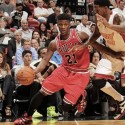 The Chicago Bulls have not been the same in terms of their stinginess on the defensive end for much of the year. Jimmy Butler decided to take the blame for it, from Chris Broussard of ESPN: “”I think it starts with me, to tell you the truth,” Butler said before Wednesday’s 101-90 loss to the Houston Rockets. “I’m supposed to be this prime-time defender and I don’t think I’ve been holding up my end of the bargain lately. So I think whenever I start kicking it up three, four notches on defense and not worry about offense as much, I think it’ll all turn around.”… “You have to pick and choose your battles and save your energy for both ends of the floor now,” said Butler, who leads the NBA at 39.8 minutes per game. “I’m not going to lie, I thought it was going to be easier than it is. But to go on one end and produce and then go on the other end and have to stop the best player on the opposing team is not always an easy task.”… But Butler insists on looking in the mirror, and he promises he’ll be better defensively over the second half of the season. “I have to do it,” he said. “That’s what my team needs me for. So I’m going to do it.”
The Chicago Bulls have not been the same in terms of their stinginess on the defensive end for much of the year. Jimmy Butler decided to take the blame for it, from Chris Broussard of ESPN: “”I think it starts with me, to tell you the truth,” Butler said before Wednesday’s 101-90 loss to the Houston Rockets. “I’m supposed to be this prime-time defender and I don’t think I’ve been holding up my end of the bargain lately. So I think whenever I start kicking it up three, four notches on defense and not worry about offense as much, I think it’ll all turn around.”… “You have to pick and choose your battles and save your energy for both ends of the floor now,” said Butler, who leads the NBA at 39.8 minutes per game. “I’m not going to lie, I thought it was going to be easier than it is. But to go on one end and produce and then go on the other end and have to stop the best player on the opposing team is not always an easy task.”… But Butler insists on looking in the mirror, and he promises he’ll be better defensively over the second half of the season. “I have to do it,” he said. “That’s what my team needs me for. So I’m going to do it.”
- LeBron James decided to get a little crazy on Wednesday, suggesting he would willingly come off the bench if that’s what was best for his team, from Chris Haynes of Northeast Ohio Media Group: “For me being the leader of the team, it doesn’t matter. Whatever this team needs in order for this team to win, I’ll come off the bench and I’m serious,” James said. “I’ll come off the bench. If it helps our team, that’s what it’s about, man.”… “It’s about a team,” James said. “How we all fit together, how the five guys on the court fit together, how the eight guys or 10 guys on the bench help the guys that’s on the floor and so on and so on. ‘Sacrifice’ is the biggest word in team sports, but it’s not about saying it, it’s about doing it as well. It’s about living it.”
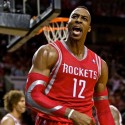 If you want to know a little more about Dwight Howard’s knee situation, Mark Berman of Fox 26 has it: “Dr. Walt Lowe on injection in Dwight Howard’s right knee:”It’s a biologically active injection that helps almost everything healing the knee.” We took some bone marrow out of his pelvis.It gives us some young,very strong platelets w/a lot of healing factors. I think his prognosis is great. This is something we did today to try to hasten the recovery time. It’s really a shot. It’s not a surgical procedure. It’s a 20 minute deal. I don’t think it’s a big deal. We want to do everything we can to give Dwight the best chance of being back as fast as he can be back. The other side of that is we want him to feel like Dwight & be a 100%when he comes back. This sort of mixes those 2 things together. I think he would get well even without this today. We’re really treating this like a bone bruise. There is nothing structurally wrong with his knee. That soreness is what we’re trying to get rid of. So we’re really basically treating a bone bruise. The time frame for these bone bruises to heal is in that 4 to 6 week time frame.”
If you want to know a little more about Dwight Howard’s knee situation, Mark Berman of Fox 26 has it: “Dr. Walt Lowe on injection in Dwight Howard’s right knee:”It’s a biologically active injection that helps almost everything healing the knee.” We took some bone marrow out of his pelvis.It gives us some young,very strong platelets w/a lot of healing factors. I think his prognosis is great. This is something we did today to try to hasten the recovery time. It’s really a shot. It’s not a surgical procedure. It’s a 20 minute deal. I don’t think it’s a big deal. We want to do everything we can to give Dwight the best chance of being back as fast as he can be back. The other side of that is we want him to feel like Dwight & be a 100%when he comes back. This sort of mixes those 2 things together. I think he would get well even without this today. We’re really treating this like a bone bruise. There is nothing structurally wrong with his knee. That soreness is what we’re trying to get rid of. So we’re really basically treating a bone bruise. The time frame for these bone bruises to heal is in that 4 to 6 week time frame.”
Jim Park is a blogger and editor of Sheridan Hoops. Follow him on twitter @SheridanBlog.